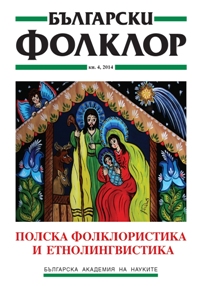Полската фолклористика между локализма и глобализма
Polish Folklore Studies between Localization and Globalization
Author(s): Violetta Krawczyk-WasilewskaSubject(s): Customs / Folklore
Published by: Институт за етнология и фолклористика с Етнографски музей при БАН
Keywords: globalization; localization; Polish folklore studies; electronic folklore (e-folklore); digital culture
Summary/Abstract: This article deals with the problems faced by the modern Polish folklore studies in the new era of cultural and virtual globalization. In the first part of the article, the author sketches the European background of the term folklore (coined by William J. Thoms in 1846) and its historical and aesthetic Polish determinants. In the second part of the article, the author describes the emergence in last two decades of folklore that has been enabled by the development of a global network based on digital electronic communication (folklore described here as electronic folklore or e-folklore). The new digital culture is seen as an emergent phenomenon arising from globalization. This new culture has changed Polish society, particularly the younger generation. Post-modern homo irretitus spends many hours a day in front of a computer screen, and in consequence online life has become an integral part of people’s existence. The new e-folklore is of great importance because it changes folklore research and study from a historical discipline studying a local heritage of ideas into contemporary anthropological and media studies.
Journal: Български фолклор
- Issue Year: XL/2014
- Issue No: 4
- Page Range: 351-363
- Page Count: 13
- Content File-PDF

